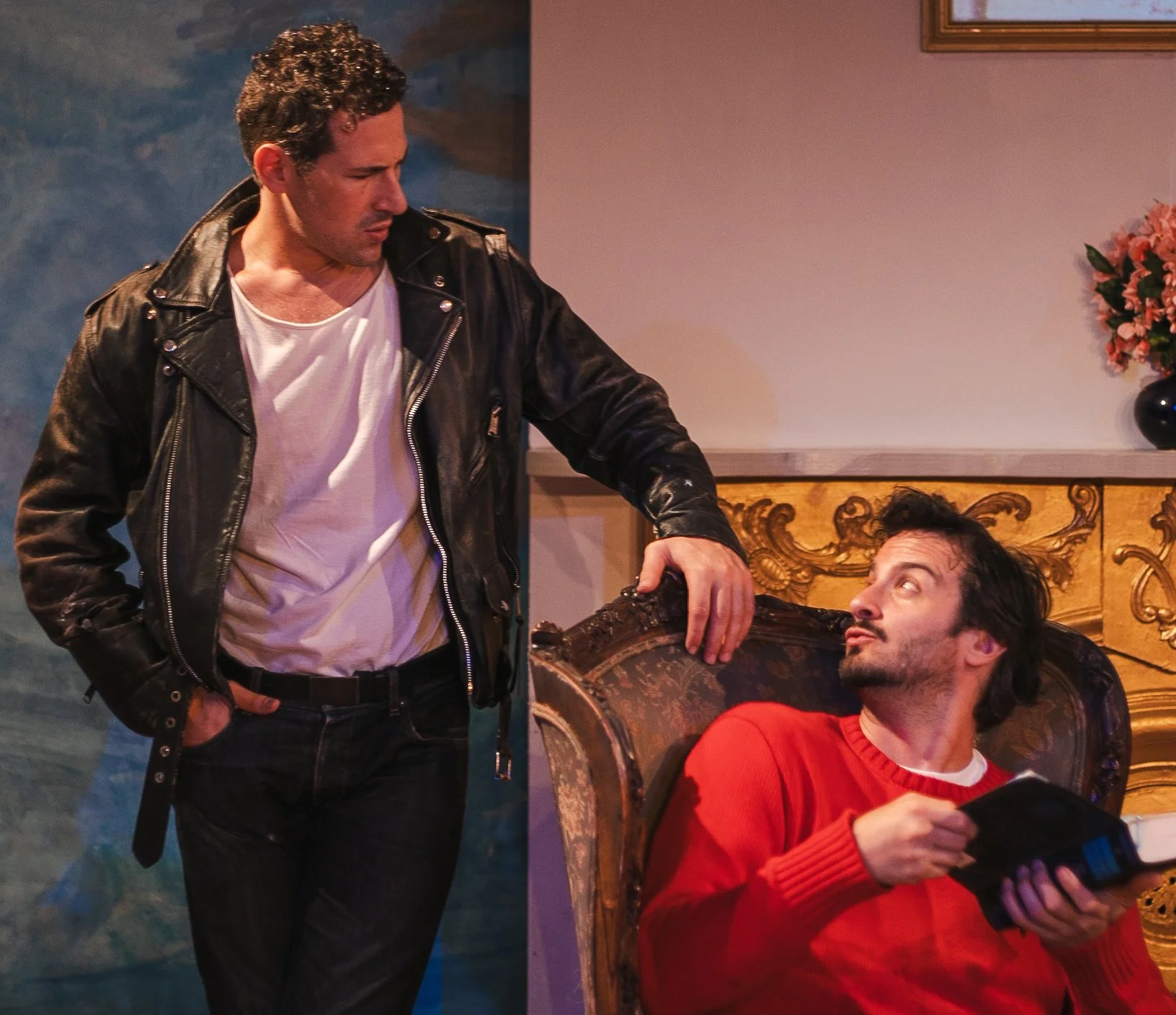Antonia (Josefina Scaro, left) introduces Maximiliano (Ben Becher, center) to a music video by Marco Antonio Solis, as her brother Lorenzo (Lucas Salvagno) looks on, in Romina Paula’s The Whole of Time at The Brick in Williamsburg, Brooklyn.
Romina Paula’s The Whole of Time chronicles the seismic impact of a seemingly casual visitor on an Argentine family. Written in 2009 and translated for the English-speaking stage by Jean Graham-Jones, the play was first presented in New York in 2024 at Torn Page, a nonprofit theater company in Chelsea. It was nominated for a Drama Desk Award that season. The Torn Page staging, directed by Tony Torn, has now been reassembled at The Brick in Williamsburg, Brooklyn, as a co-production of The Brick and A/Park Productions.
Maximiliano distracts Lorenzo from the final 20 pages of Melville’s Moby-Dick.
The Whole of Time takes place during the “early 21st century” in the apartment of a cosmopolitan Buenos Aires family. Ursula (Ana B. Gabriel) is the daughter of Hungarian immigrants; her adult children, Lorenzo (Lucas Salvagno) and Antonia (Josefina Scaro), have grown up in both Argentina and Mexico. The forceful, interfering mother, reclusive daughter, and the son who’s a wayfarer at heart are reminiscent of the less urbane Wingfield family in Tennessee Williams’s The Glass Menagerie. (In promoting this play, the producers have acknowledged the playwright’s inspirational debt to Williams and specifically Menagerie.)
As in The Glass Menagerie, a “gentleman caller” comes into the family’s midst. This visitor is Maximiliano (Ben Becher), a bartender at the restaurant where Lorenzo works. He doesn’t have his hosts’ range of cultural references—the names of Frida Kahlo, Herman Melville, and Mexican singer-songwriter Antonio Marco Solís ring no bells for him. But his presence has a potent effect on all three in the household.
Both siblings exist in a state of protracted adolescence, still residing with Ursula and staving off the start of adult life. Lorenzo is waiting tables at a nearby restaurant, desultorily plotting a move to Spain where he’ll be able to assert his independence (though uneasy about sharing his inchoate plans with his sister). Antonia is inordinately attached to her brother (an attachment that’s erotically charged). She seldom ventures away from home, engaging with the wider world instead through her laptop. Ursula, also, is in limbo, still fussing over her grown children, going on aimless dates, and medicating dissatisfaction with booze.
Ursula (Ana B. Gabriel, left) and Antonia share an intimate, mother-daughter moment in The Whole of Time. Photographs by Catalina Recalde.
The 70-minute play begins and ends with Solís’s “Si no te hubieras ido” (“If You Hadn’t Gone”), which the translator renders as “There’s Nothing More Difficult Than Living Without You.” Antonia, directing her brother’s attention to Solís’s filmed performance of this lament about lost love on her laptap, comments, “Just look at how those women stare at him in his concerts. The men too, everybody’s captivated, enthralled like they’ve been hypnotized.”
The play’s hypnotist is Maximiliano, who shows up to collect Lorenzo for a night on the town. Lorenzo, however, wants to finish the last 20 pages of Moby-Dick (the part in which Ishmael recounts the catastrophic end of Ahab’s pursuit of the white whale); so he excuses himself, leaving Maximiliano and Antonia to become acquainted. Maximiliano ends up spending the whole evening conversing intimately with the three family members, in various combinations, and bringing them under his spell.
Paula’s dialogue is arresting, even when ambiguous. Under Torn’s swift-paced direction, the four fine actors negotiate the script’s tension and dissonance with the delicacy and balance of a well-practiced string quartet. As the neurotically close, achingly unhappy family, Gabriel, Scaro, and Salvagno are fascinating to watch. Clad in white T-shirt and jeans (the uniform of early Actors Studio males), plus a Brandoesque black leather jacket, Becher channels the broody presence of noteworthy actors in Williams’s plays of the 1950s (one of whom, Rip Torn, was Tony Torn’s father).
As Antonia and Maximiliano become acquainted, he interrogates her about her reclusiveness.
At first, Maximiliano is a gentle interrogator, asking Antonia, for instance, what do you do “with your life?” When he gets a response that puzzles him (such as Antonia’s “Oh, nothing … at least according to the terms you’re asking me, nothing”), he deftly puts his interlocutor in the witness box. Ultimately, he penetrates the familial clique with suave confidence and eerie charm, applying psychic fission to the seemingly inseparable three.
Scenic designers Andromache Chalfant and Rebecca Lord-Surratt have transformed The Brick’s performance space into a replica of the parlor floor in the Federal-style house where the play ran a year and a half ago. Transported to The Brick, which accommodates a larger audience, the production’s modest scale and the intimacy of the actors’ performances have been preserved. It’s a high point this year for Off-Off Broadway.
The Whole of Time runs through Sept. 20 at The Brick Theater (579 Metropolitan Ave., Brooklyn). Evening performances are at 7 p.m. Monday and Tuesday and at 8 p..m. Wednesday through Saturday. For tickets and more information, visit bricktheater.com/the-whole-of-time.
Playwright: Romina Paula
Translator: Jean Graham-Jones
Direction: Tony Torn
Scenic Design: Andromache Chalfant & Rebecca Lord-Surratt
Costume Consultant: Zane Gan
Lighting Design: Jay Ryan
Scenic Backdrop: Donald Gallagher






